Celebrating Diwali in an Intercultural Family
One of the wonderful benefits of being in an intercultural relationship is that you get to celebrate double the holidays and festivals – and even more so if your partner practices another religion. Marrying in to an entirely different culture means you get to learn firsthand about how these annual traditions are performed within the home.
Which in turn, is your home – and it becomes the traditions that you will pass on in your own family unit to future generations. Taking the initiative to learn about your spouse’s cultural holidays is very important in an intercultural relationship and it will also mean a lot to your partner.
By learning about and celebrating your spouse’s familial traditions, you are essentially honouring them and making an effort to understand where they come from. You are embracing diversity and accepting another way of life and a way to commemorate joy.
It is also very important for biracial children to be raised in a family that rejoices both cultures – honouring the child’s own diverse backgrounds. Not to mention, giving them some great childhood memories.
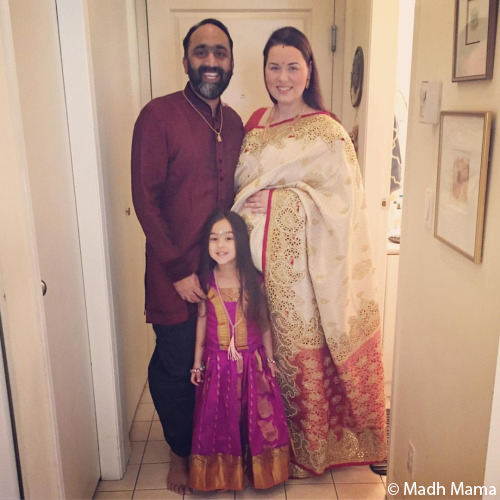
For those who are married to an Indian spouse, Diwali is probably the first big festival you will learn about since it is widely celebrated across India in Hindu families. Whether you live in India with your Indian spouse, or live outside of India – celebrating Diwali is a big milestone and a tradition that should be acknowledged every year. From someone who knew nothing about Diwali, I slowly learned about it over the years and now it’s an annual tradition of ours that I eagerly look forward to.
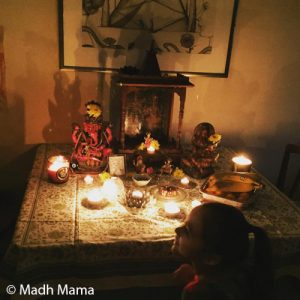
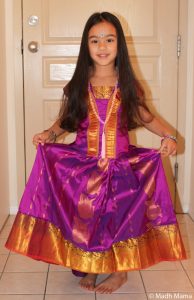
At first, I was a little overwhelmed by it as it is such a huge festival and I really wanted to do it justice, but every year, I learned a little bit more as each year passed. It is a very fun festival that brings a lot of joy to our home.
Here are my top 5 tips for celebrating Diwali in an intercultural family:
1. Learn about it
Take the initiative to read up on it. Read articles about it. Watch videos about how it is celebrated in India. Ask questions. Ask your spouse how they celebrate it in their family, and any memorable moments from Diwali’s celebrated from years past. Be curious, and educate yourself slowly. Ask around and see if there are any Diwali events in your city at temples, community centres, or if anyone you know is having a gathering.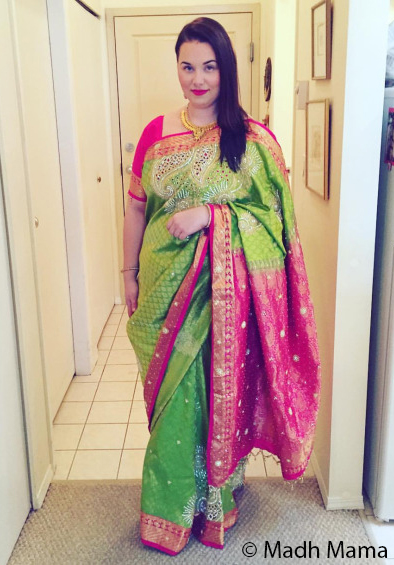

2. Dress Up
A standard Diwali tradition is to buy new clothes for the festive season and dress up to the nines. It’s kinda like dressing up for presidential Christmas dinner – but times one thousand….and sparkly! Most Firangi Bahu‘s have tons of Indian attire that rarely ever get used – guys, this is your chance!!! Remember that beautiful silk saree that so-and-so’s aunty gave you but you never had a chance to wear yet? Wear it! And don’t forget to accessorize fully (bindi, bangles, necklace, earrings).
3. Decorate your house with lights
Diwali is a festival of lights and it is all about the battle of good over evil, and light over darkness. So, it would make sense, in a literal way, that there would be a lot of light. You can decorate your house or apartment with indoor and outdoor lights, and have light displays in your home, particularly around the iconography of Hindu Gods and Goddesses. You can use plug-in lights, Christmas lights, candles, diya’s – you name it! Remember you simply cannot overdo it with the lights. If you think it might look like too much, add a little more!
4. Participate in a Pooja
Diwali is a Hindu festival and if your spouse is Hindu they might want to perform or attend a pooja to ring in the new year. Even if you don’t understand the pooja, it is always nice to watch, observe, learn, and pay your respects to your spouse’s religious practices. If you have children, they can help perform the pooja as children love participating in these functions with fascination.
5. Get together with friends for a potluck
Diwali is all about togetherness – celebrating with family and friends and spending time together. You can organize a get-together and have a Diwali lunch/dinner and have everyone bring their own dishes so that you have a big potluck. If Diwali falls on a weekday, you can also have it on a weekend when everyone is off work. If you have desi friends that are living away from their families, you can invite them. If you have friends who have never celebrated Diwali before, it would be a great opportunity to invite them so they can celebrate it firsthand and learn more about Indian culture.
©masalamommas and masalamommas.com, 2016-2017. Unauthorized use and/or duplication of this material without express and written permission from this site’s author and/or owner is strictly prohibited. Links may be used, provided that full and clear credit is given to masalamommas.com and Masalamommas online magazine with appropriate and specific direction to the original content.
(Visited 497 times, 1 visits today)


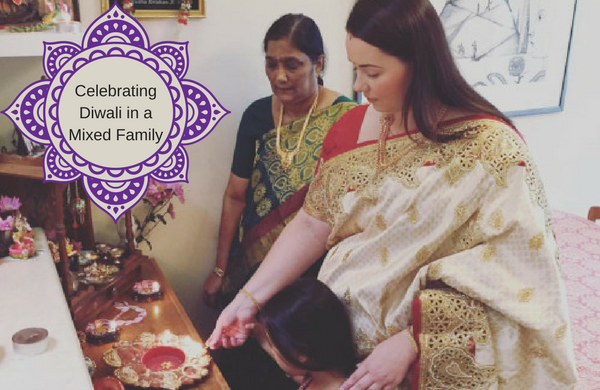
Great post, Alexandra. As for my firangi bahu experience, I don’t participate in the pooja, but I stand by respectfully. I have never had any issues regarding religion in my Hindu family, I’m proud to say. Hindu tolerance is such a blessing in a world rife with bigotry. Like you, I wear the sari and cook the food. But the food in north India is probably very different from the Tamil cuisine. Happy Diwali to your house from mine. Maria